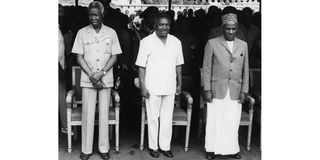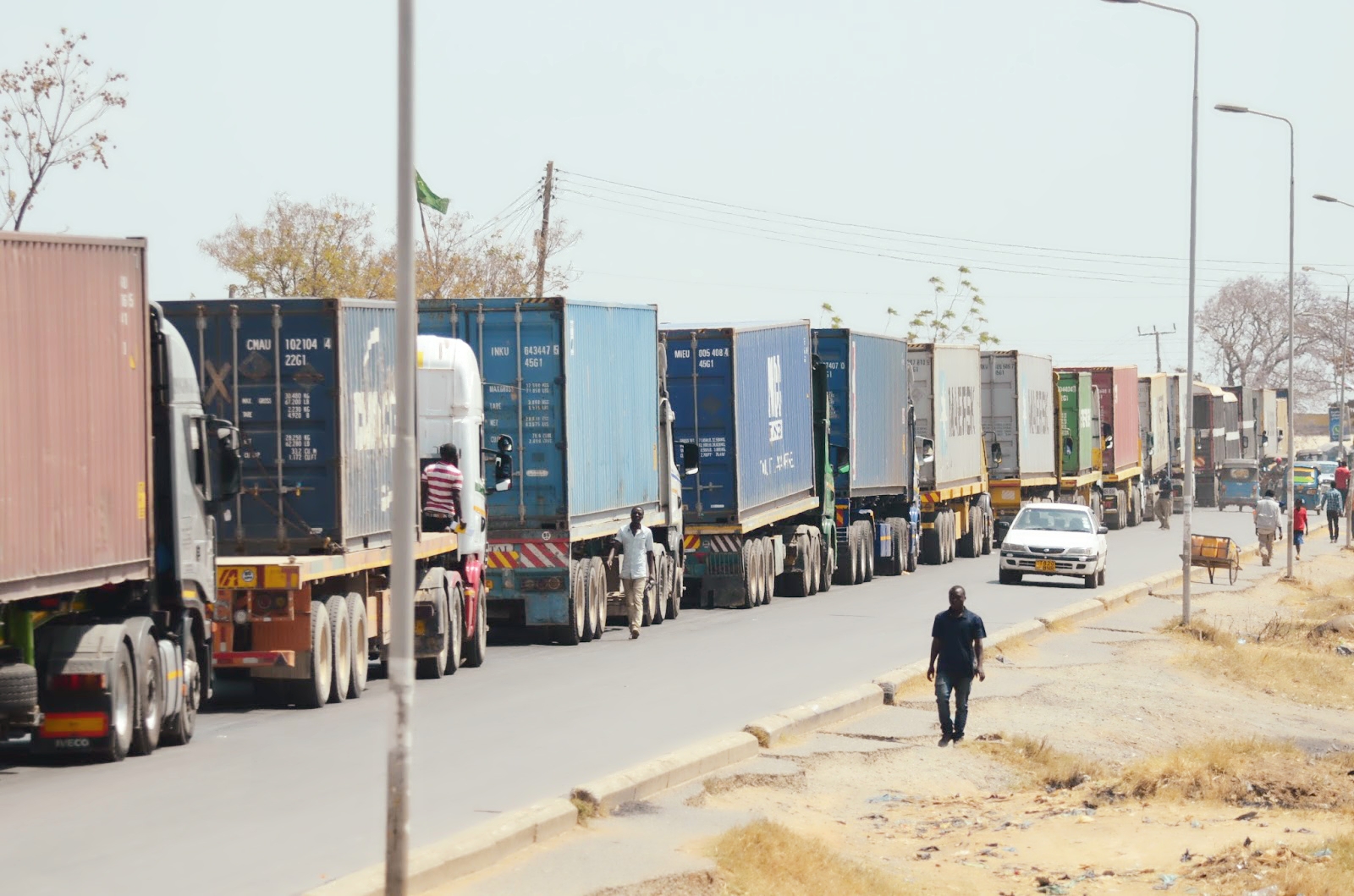Prime
How Tanzania started its relationship with IMF, World Bank

Tanzania’s president-elect Ali Hassan Mwinyi (centre) poses with the out going President Julius Nyerere (left) and the man who takes over as Zanzibar’s President Idris Abdul Wakil (right) on October 1985. Former Tanzanian president Ali Hassan Mwinyi who introduced multi-party democracy to the East African nation died on Thursday aged 98, the presidency said. PHOTO | FILE
What you need to know:
- The continued poor state of the economy saw Tanzania swallow its pride and conceding that the founding President Julius Nyerere’s socialist ideologies had failed, thus the need to start engaging the IMF and the WB.
Dar es Salaam. Engaging the Bretton Woods Institutions to fine-tune Tanzania’s economy was a difficult decision for the country’s leaders to make 10 years before Ali Hassan Mwinyi assumed office.
However, with the economy deteriorating between 1975 and 1985, the government, under founding President Julius Nyerere, was left with no option but to do what was being viewed by many government and party stalwarts as a ‘grave sin’ at that time.
And, contrary to some widely held assumptions that the desire to engage the International Monetary Fund (IMF) and the World Bank (WB) started during the Mwinyi administration, the former President Mwinyi writes in his memoirs that actually, the exercise started 10 years before he ascended to the presidency.
The continued poor state of the economy saw Tanzania swallow its pride and conceding that the founding President Julius Nyerere’s socialist ideologies had failed, thus the need to start engaging the IMF and the WB.
“Contrary to what others think, I am not the one who initiated negotiations between the government, the IMF and the World Bank. Negotiations started during the reign of Father of the Nation, Mwalimu Julius Nyerere,” Mr Mwinyi writes in his memoir titled ‘Mzee Rukhsa: Safari ya Maisha Yangu, which is Kiswahili for ‘Mzee Rukhsa: Journey of My Life’.
During that time, it was a political suicide mission for a Tanzanian leader to engage with the IMF and the WB. This was because the two organisations were in the bad books of Tanzanians during the Nyerere era.
However, right before Mr Mwinyi came to power, the economy, which was already in the doldrums, faced further challenges due to a $100 million fall in foreign exchange earnings due to a drop in coffee exports. The 1979 war against the invasion of Uganda’s Idi Amin cost Tanzania a cool $500 million, while another $100 million had to be spent on aiding the new government in Uganda to get back to work.
The 1979 floods also cost the country another $100 million, while the dry spell that followed was also estimated to have had another $100 million impact on the economy. As explained by Mwinyi in his memoirs, the dry spell forced Tanesco (Tanzania Electric Supply Company Limited) to order large-scale power consumers, including manufacturing industries, to halt production for the whole month of November 1980.
This further damaged the economy. That was to be followed by a steep rise in global fuel prices, which saw the government spend an additional $150 million of its meagre foreign reserves on the importation of petroleum products. As such, former President Mwinyi writes, the economy lost about $1.5 billion during the period between 1977 and 1981.
“Whichever the situation, we had no option but to engage the IMF,” he writes. With a need for money, Tanzania was issued a loan with the condition of devaluing its local currency by 25 percent.
Amidst economic hardships, Nyerere told Tanzanians to tighten their belts in September 1979. Nevertheless, he kept trying to dodge the IMF and WB in finding a lasting solution to the country’s economic woes. When it was open that little would be achieved, Nyerere conceded to engaging the two organisations, which would culminate in Tanzania receiving a loan.
The IMF, however, attached the loan to seven conditions, which, though accepted by the then Finance minister, Mr Edwin Mtei, were trashed by Nyerere.
Under the conditions, the Tanzanian shilling was to be devalued by 25 percent, and instead of regulating loans, the government would be required to raise bank interest rates on the same loans.
The IMF, Mr Mwinyi writes, also wanted the government to reduce its social services, including health and education. The planned salary increase was to be halted if the IMF’s conditions were to be followed.
“However, the government could not heed that advice, and instead, it raised the minimum pay by 26 and 36 percent for workers in urban and rural areas, respectively,” he says. While the IMF wanted the government to scrap a tendency towards regulating prices, the government did not buy the idea; instead, it improved the regulatory mechanism.
A piece of advice to lessen import controls was also trashed by the government, though it allowed the importation of more products that were meant to boost the country’s production and transportation requirements.
In 1979, a team of IMF experts arrived in Tanzania on a mission to follow up on their recommendations. “Mwalimu strongly differed with them so much so that they had to be chased out of the country, a development that saw Mr Mtei resign from the post of Finance minister,” Mr Mwinyi writes.
The decision resulted in several new economic challenges in Tanzania, with the inflation rate rising from between 8 and 10 percent to over 20 percent, whereas industrial production dropped by between 20 and 25 percent.
Tanzania also registered a record level of scarcity of basic needs like clothes and even salt. The situation was followed by a strong-worded statement by Nyerere castigating the IMF’s position during the sherry party. “When did the IMF become the International Ministry of Finance? When did nations surrender to it their powers of decision-making?” Mr Mwinyi quotes his predecessor as saying.
Despite such a position, the economic situation kept deteriorating, and in April 1980, the then IMF managing director, Mr Jacques de Larosiere, wrote to Mr Nyerere, asking him to get back to the discussion table.
A new IMF team arrived, and in September 1980, the two parties reached an agreement on the Extended Fund Facility. With more economic hardships locally, which at one point forced the country to negotiate with other countries on barter trading as a way of dodging the use of its scarce foreign exchange reserves, Nyerere was slowly but surely adopting some of the IMF’s conditions for a free market economy.
“I am sure not all of the modern-day Tanzanians will understand that Nyerere reluctantly accepted that parents and guardians should start contributing towards education costs. In the same vein, Nyerere accepted that an agreement with the IMF could not be avoided, though he did not accept all the conditions by the time he left office,” writes Mr Mwinyi.
He said it was based on such a background that he became President of Tanzania in 1985.
“When I became President my priority was to deal with economic hardships, especially getting foreign exchange. The shortest way to achieve that was to complete the negotiations with the IMF and one of the conditions that I was given was to make a robust economic transformation,” he writes.




